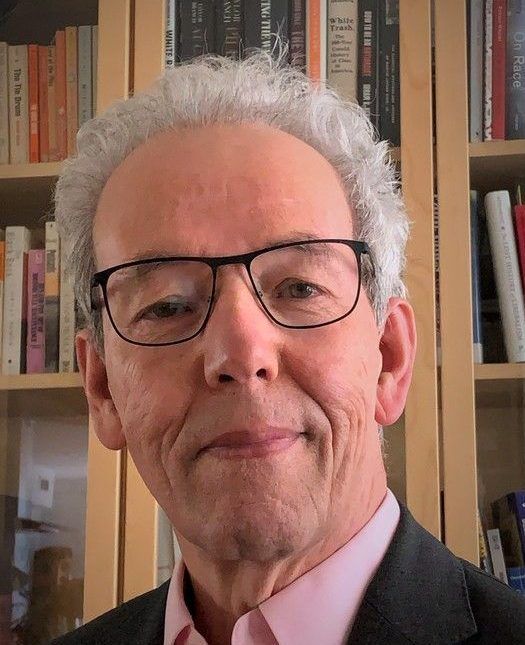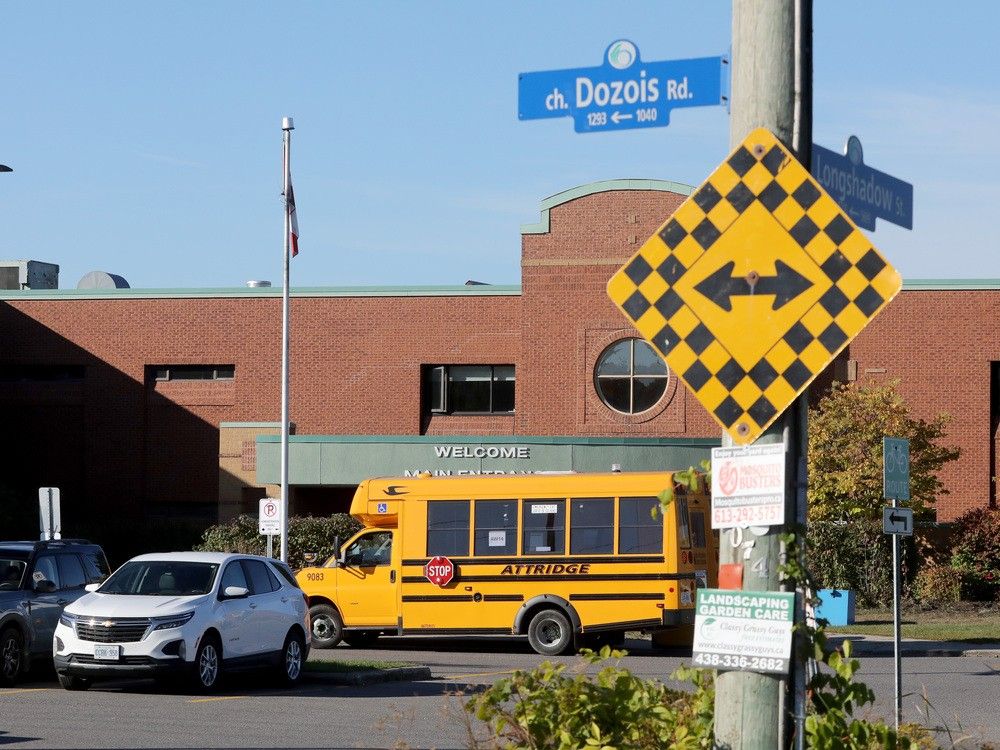The school community at St. Mark High School in Manotick was put on high alert last weekend after the Ottawa Catholic School Board
learned of threats
made in response to a staff member’s social-media posts.
The posts were about the killing of right-wing media commentator Charlie Kirk, who was shot in the neck April 10 while speaking at Utah Valley University. Attributed to a teacher by online sources, the comments referred to Kirk as a “hateful, evil man” and declined to express sadness about his demise.
“Racist, transphobic and antifeminist,” the post circulated online said. “His rhetoric hurt people and he has even said that empathy was a made-up word. So I feel no sorrow at all. I don’t have to and that doesn’t make me a bad person.”
An anonymous Facebook post identified the teacher and the school. “Be careful who’s teaching your kids. These domestic terrorists are in our schools,” one message said, while others called for the teacher’s dismissal, even providing e-mail addresses at the Ottawa Catholic School Board.
Media organizations across the United States have reported that dozens of teachers and other educators have been suspended or dismissed for social-media comments about Kirk’s death. Vice-President J.D. Vance said Monday that people who celebrated Kirk’s killing should be held accountable.
“Call them out, and hell, call their employer,” Vance said in an episode of the Charlie Kirk Show. “We don’t believe in political violence, but we do believe in civility.”
Many employers are disciplining employees about what they say on social media, even if it’s not about the workplace, says James Turk, director of the Centre for Free Expression at Toronto Metropolitan University.
“Things have changed because everyone has the ability to publicize their views. Each of us has become a publisher,” Turk says.
“We are operating in ways that are visible that were never visible before. It makes it easier to put pressure on people, embarrass them and shame them.”

School boards can and do
discipline teachers
for social-media posts, although the details are usually only made public after a teacher appears before the disciplinary panel of the Ontario College of Teachers.
In June 2017, the Durham District School Board investigated and reviewed teacher Lucas Thad MacDonald’s Twitter account after receiving a call from a parent reporting concerns about racial and homophobic comments, and comments regarding gender issues. The board suspended MacDonald for two days without pay and transferred him to another school.
In another case, the Dufferin-Peel Catholic District School Board started an investigation into comments made by teacher Nadia Shoufani at a pro-Palestinian rally in 2016 after Friends of Simon Wiesenthal Center and B’nai Brith Canada had accused her of publicly supporting violence and terrorism in Israel.
Both cases were sent to the
Ontario College of Teachers
‘ disciplinary panel. The college, which certifies teachers in the province, can decide on a broad range of disciplinary actions against teachers, including revoking certification.
The panel found
that MacDonald had retweeted without critical comment posts that included offensive comments about Muslims, immigrants, refugees and those who identified as a gender different from their gender assigned at birth.
A lawyer for MacDonald argued that the incidents involved MacDonald’s private life and there was no evidence of harm to students, the school or the college. He also argued that the conduct was “within the purview of public political discourse” and maintained that MacDonald had a “momentary lapse in judgment … in the absence of a clear standard for the profession on this issue.”
The disciplinary panel found that students who were part of any of these groups would “likely feel uncomfortable having him as a teacher if they knew he found such views worthy of sharing.”
MacDonald was ordered to appear before the college’s discipline committee for a reprimand, was suspended for 10 days and was required him to complete a communications and sensitivity training course.
Shoufani was not disciplined. The reasons behind the decision were not posted by the college.
Previous disciplinary panel decisions have also considered the right of teachers to say what they want.
In a 2007 decision in the case of Paul Fromm, a teacher who founded an organization that alleged multiculturalism was damaging society, the college affirmed that freedom of speech was guaranteed in the Charter of Rights and Freedoms and a teacher could say what he liked — provided it was within the law.
“But that doesn’t mean, necessarily, that he can also be a teacher when he says those things,” the panel’s decision said. “There are limits on freedom of speech that a teacher can engage in and still play the very important role that our society requires with respect to teachers.”
Fromm’s teacher certification was revoked.
In a 2017 professional advisory, the college noted there was a distinction between the professional and private lives of teachers, but off-duty conduct mattered and sound judgment and due care must be exercised.
“Even the most innocent actions can be easily misconstrued or manipulated. The immediacy and simplicity of a text message, for example, may lead to longer, informal conversations that become personal,” the advisory said. “Social media encourages more casual dialogue. Rules may relax and informal salutations may replace time-respected forms of professional address.”
The advisory also referred to a 1996 Supreme Court of Canada decision in the case of Malcolm Ross, a New Brunswick teacher who maintained that the Holocaust had been a hoax and was the subject of a human rights complaint. Ross was removed from the classroom, but the decision was overturned by the New Brunswick Court of Appeal.
The Supreme Court ruled that teachers’ off-duty conduct, even when not directly related to students, was relevant to their suitability to teach.
The decision said it was not advocating to subject the entire lives of teachers to inordinate scrutiny on the basis of more onerous moral standards of behaviour.
“This could lead to a substantial invasion of the privacy rights and fundamental freedoms of teachers,” the decision said.
“However, where a ‘poisoned’ environment within the school system is traceable to the off-duty conduct of a teacher that is likely to produce a corresponding loss of confidence in the teacher and the system as a whole, then the off-duty conduct of the teacher is relevant.”
School boards have their own policies.
The Ottawa Catholic School Board’s 2010 social-media policy said staff may be disciplined “if their social-media activity, whether personal or work-related, results in a disruption to the school or board environment or negatively impacts the individual’s ability to perform his or her duties.”
The Ottawa-Carleton District School Board issued a policy on social-media use by employees in June 2024. It encouraged teachers to separate professional and personal use of social media and to maintain a sense of professionalism at all times in both cases.
Personal websites and comments not related to the school district will also clearly state that staff are not representing the views of the school, department, district, or board, the OCDSB procedure said. However, such a disclosure does not absolve an employee from adhering to the procedure or from potential consequences.
Teachers have the same freedom of speech rights as any other citizen, Turk said.
“No teacher has the right to discriminate against students, but it’s not unprofessional to have unpopular views. You don’t give up freedom of expression because you’re a teacher,” he said.
There are exceptions, for example if comments are defamatory, if they incite hate against an identifiable group or if they incite violence. In the case of the St. Mark teacher, Turk said the instructor was not advocating violence.
“She was troubled by what he said and she was not sorry he was gone,” Turk said.
His fear is that risk-adverse school boards will bow to public pressure. He argues, for example, that the Ontario College of Teachers should never have investigated Nadia Shoufani.
“The allegation against her is that was that she spoke at a pro-Palestinian event, which she clearly has a constitutional right to do. It was a vexatious complaint which never should have been taken up by the college.”
Investigations can be a form of discipline, Turk said.
“Anyone can demand that a school board do anything. If a school board were to act on it, then it becomes a serious problem,” he said.
“In the present context, where things are so polarized, school boards will be pressuring teachers to mute their freedom of expression, especially political expression.”
Our website is your destination for up-to-the-minute news, so make sure to bookmark our homepage and sign up for our newsletters so we can keep you informed.
Related
- Alleged death threat against singer Morrissey leads to charge against Ottawa man
- Deachman: How did Ottawa drivers get to be so horrible?



